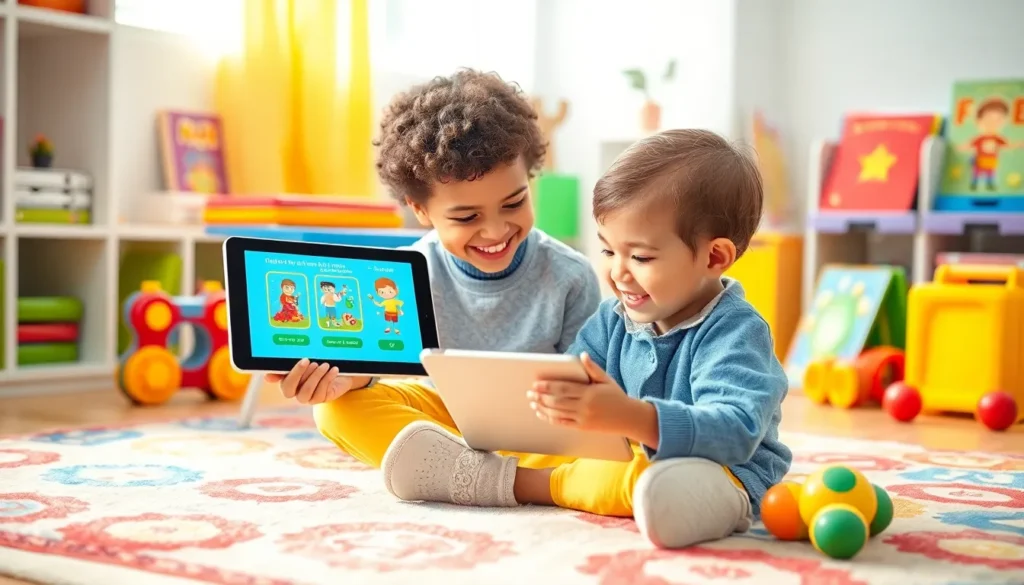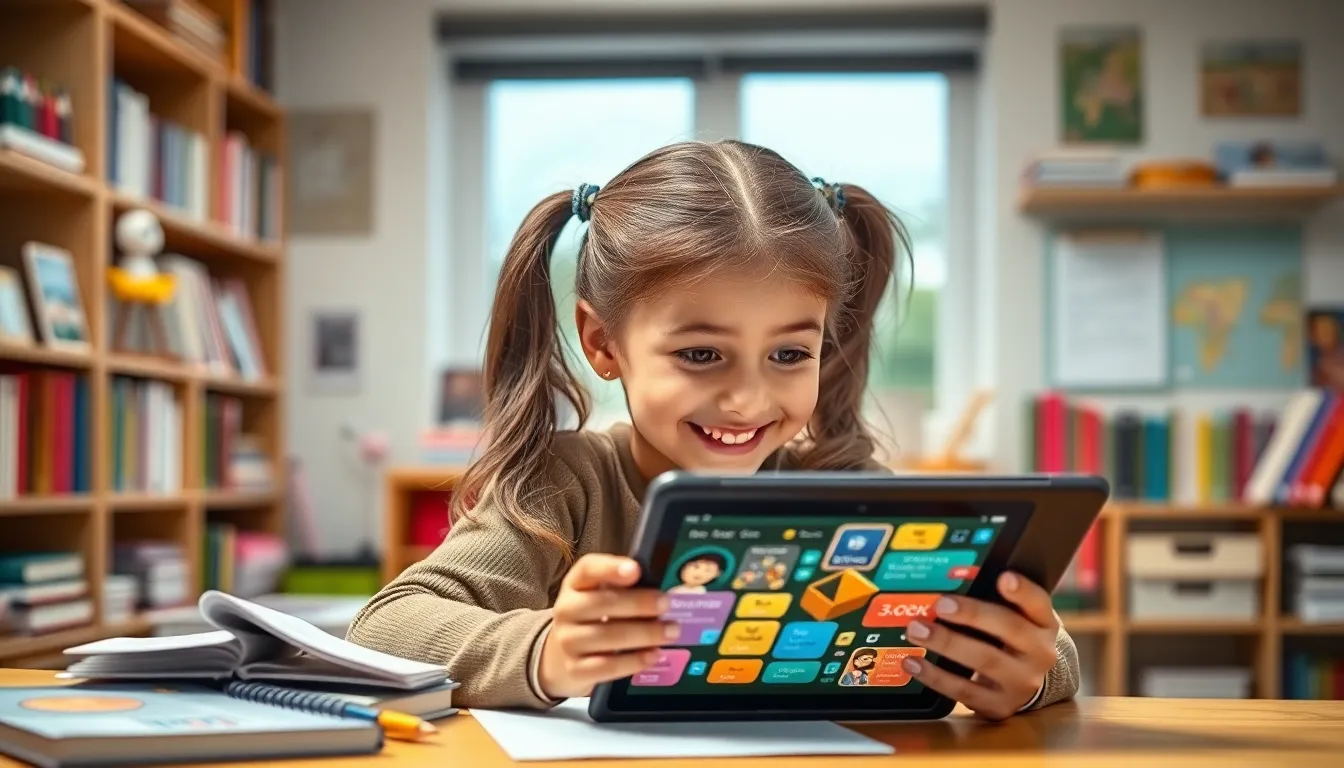In a world where kids can master a tablet faster than they can tie their shoelaces, educational apps have become the superheroes of learning. These digital sidekicks turn mundane lessons into thrilling adventures, making math and reading feel like a game of tag. Imagine your child diving into a sea of knowledge while dodging pesky distractions—sounds like a win-win, right?
Table of Contents
ToggleOverview of Educational Apps for Kids
Educational apps for kids serve as effective tools for enhancing learning experiences. These apps offer interactive content designed to engage children in various subjects. It’s crucial to provide options that align with each child’s learning style. Various types of apps focus on subjects like math, reading, science, and arts, ensuring diversity in educational content.
Many educational apps incorporate gamification, making learning fun and motivating. Kids often respond positively to rewards and challenges within the app, increasing their investment in the learning process. Apps also frequently allow for progress tracking, giving parents and educators insights into each child’s development.
Additionally, interactive features such as quizzes and puzzles encourage critical thinking skills. Children benefit from immediate feedback, allowing them to learn from mistakes in real time. Some platforms even adapt to individual learning speeds, offering a personalized approach to education.
Accessibility remains a key advantage of educational apps. Families can utilize these tools at home or on-the-go, turning travel or waiting times into productive learning opportunities. Furthermore, many apps include collaborative features, enabling kids to connect with peers for group learning, fostering social skills.
Parental controls and educational reports enhance the safe use of these apps, helping guardians monitor screen time and content exposure. Effectively selecting high-quality educational apps ensures a balanced approach to technology in children’s lives.
Benefits of Educational Apps
Educational apps provide significant advantages for children’s learning. These tools enhance the educational experience through interactive content that caters to different learning styles.
Enhancing Learning Experience
Educational apps deliver tailored lessons that align with children’s individual needs. Content related to subjects like math, science, and reading becomes more relatable and easier to grasp. Engaging elements, such as quizzes and puzzles, reinforce knowledge retention. Many apps track a child’s progress, allowing parents and teachers to identify strengths and areas for improvement. This feedback loop supports targeted learning strategies. Overall, educational apps transform traditional methodologies by integrating fun with effective learning.
Promoting Engagement and Motivation
Gamification elements in educational apps capture children’s interest and boost motivation. Features like rewards and challenges encourage users to engage consistently with learning material. This interactive approach helps maintain focus, limiting distractions commonly found in traditional classroom settings. Additionally, collaborative features foster peer interaction, enhancing social skills while learning. Kids become more invested in their education as they experience enjoyment and achievement. Sustaining their excitement makes the learning process dynamic and fulfilling.
Types of Educational Apps
Educational apps come in various formats, catering to distinct learning needs and styles. By exploring these categories, parents and educators can identify the best tools for children’s educational journeys.
Interactive Learning Games
Interactive learning games stand out by blending education with play. These apps create immersive experiences where kids solve puzzles and complete tasks to advance through levels. Gamified elements like rewards keep children motivated and engaged with the material. Many of these games adapt to individual skill levels, ensuring each child progresses at their own pace. For example, apps like Prodigy Math allow children to explore math concepts in a fun way, fostering critical thinking skills while maintaining a playful environment.
Creative and Artistic Apps
Creative and artistic apps encourage self-expression and imagination. These tools let children explore visual arts, music, and design, promoting creativity alongside learning. Through activities like drawing, painting, and music composition, kids can develop their artistic skills while engaging in hands-on projects. Apps like Toca Boca provide a platform for imaginative play, allowing children to create stories and scenarios. This creative process reinforces skills while capturing kids’ interests, making it easier for them to learn across various subjects.
Language and Literacy Apps
Language and literacy apps focus on developing reading, writing, and comprehension skills. These applications often feature interactive stories and phonics activities to build strong language foundations. Engaging formats keep children excited about reading, aiding vocabulary expansion and improving fluency. Apps like Endless Alphabet and Starfall offer engaging lessons that align with children’s developmental stages. By incorporating fun animations and characters, these resources motivate kids to practice language skills regularly, laying the groundwork for lifelong literacy.
Considerations for Parents
Parents must consider several factors when choosing educational apps for their children. Important aspects include age appropriateness and adherence to screen time guidelines.
Age Appropriateness
Selecting apps that match a child’s developmental stage ensures effective learning. Each age group benefits from content specifically designed for their cognitive abilities. For instance, toddlers may require simple, interactive interfaces, while older children engage better with more complex material. App stores often categorize apps by age, making it easier to find suitable options. Parents should carefully review descriptions and ratings to ensure alignment with their child’s skills and interests. Engaging with apps designed for a particular age group promotes motivation and enhances learning experiences.
Screen Time Guidelines
Establishing screen time limits aligns app use with healthy habits. Experts recommend balancing educational app time with physical activity and offline interactions. For children aged 2 to 5 years, about one hour of high-quality programming per day is advisable. Older children may benefit from consistent schedules that allocate time for app use. Parents should monitor usage, ensuring educational activities remain a positive and enriching part of the daily routine. Setting boundaries fosters a healthy relationship with technology, allowing children to benefit from educational apps while avoiding excessive screen exposure.
Popular Educational Apps for Kids
Educational apps provide numerous options for children, catering to various subjects and learning styles. Here are some notable recommendations and insights about user experiences.
App Recommendations
- Khan Academy Kids offers interactive lessons across subjects like math and reading.
- ABCmouse supports early learners with engaging activities in literacy, math, and art.
- Prodigy Math gamifies math learning, encouraging kids to solve problems in a fantasy setting.
- Duolingo engages users in language acquisition through fun exercises and themed lessons.
- Endless Alphabet enhances vocabulary with animated characters and illustrations.
These apps actively engage children, making learning enjoyable while building essential skills.
User Reviews and Feedback
Parents frequently praise Khan Academy Kids for its comprehensive approach and adaptability. Feedback highlights the app’s ability to cater to different learning levels. ABCmouse receives accolades for its user-friendly interface and diverse content. Many users appreciate the structured learning path it provides. Conversely, Prodigy Math stands out for motivating kids through game mechanics, making math less daunting. Users report significant improvements in their children’s confidence. Overall, educational apps draw positive reviews for enhancing learning experiences and promoting consistent educational engagement.
Conclusion
Embracing educational apps can significantly enhance children’s learning experiences. These tools not only make learning interactive and fun but also cater to individual learning styles. By selecting the right apps that align with a child’s developmental stage and interests, parents can foster a love for learning that lasts a lifetime.
With features that track progress and promote collaboration, educational apps offer valuable insights for parents and educators alike. Balancing screen time while encouraging engagement ensures that kids benefit from technology without losing sight of healthy habits. As families navigate the digital landscape, the right educational apps can serve as powerful allies in shaping young minds for success.











